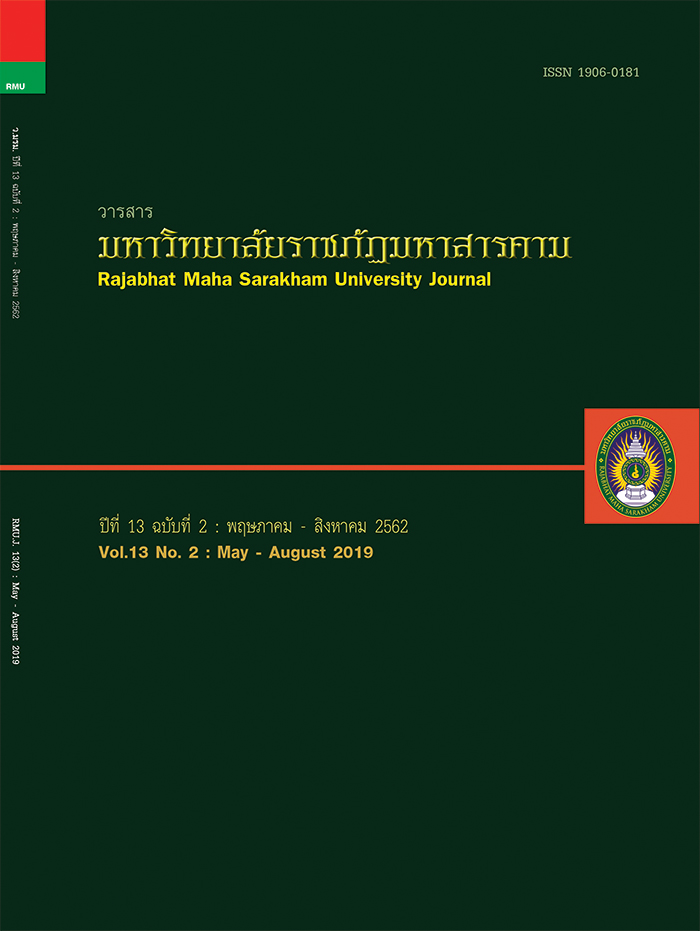Personal Financial Planning Model Based on the Sufficiency Economy Principle
Main Article Content
Abstract
This research aimed to 1) study the level of personal financial planning based on the Sufficiency Economy Principle, 2) study the economic factors influencing personal financial planning based on the Sufficiency Economy Principle, and 3) study the model of personal financial planning based on the Sufficiency Economy Principle. This research was a quantitative research in which 400 samples were selected from the population living in Mueang District, Maha Sarakham Province. The questionnaire was used as a tool for collecting data. The data were analyzed to determine the percentage, standard deviation and Pearson Product Moment Correlation. Multiple Linear Regression Analysis was used to test the predictive equation. The research revealed that 1) when considering all aspects, the average score of personal financial planning level based on the Sufficiency Economy Principle was high. In consideration of each aspect, it was found that the assessment of the financial status based on the Sufficiency Economy Principle was at a high level followed by personal financial targeting based on rationality, monitoring and improving financial plan based on knowledge and morality, and the implementation of the financial plan based on financial immunization principle, respectively. 2) Regarding factors influencing personal financial planning based on the Sufficiency Economy Principle using the Multiple Regression Analysis method , it was found that all three predictor variables: Income - Expenditure (x1), Inflation (x2), and Interest Rate (x3) were entered in the equation. The overall prediction was 0.575, (R 2 = 0.575). The correlation coefficient was 0.758 (R = 0.758). The result showed that Income - Expenditure (x1) and Interest Rate (x3) were the variables affecting personal financial planning based on the Sufficiency Economy Principle (y) but the inflation (x2) did not statistically affect the personal financial planning under the Sufficiency Economy Principle (y) at 0.05 level of significance. 3) The model of personal financial planning based on the Sufficiency Economy Principle formulated by analyzing the predictive equation in a raw score form was : y = 1.271 + 0.326x1 + 0.297x3 and in a standard score was Zy = 0.421Z1 + 0.365Z .
Article Details
1. All articles undergo a thorough with at least three reviewers evaluating their suitability within the respective field of study, during the double-blind review.
2. The views expressed by individual authors do not represent the official views of the Editorial Boards of RMUJ: The author of each articie is responsible for all its contents.
3. The Editorial Boards do not reserve the copyrights. but proper citations need to be made.
References
Promotion Center for Knowledge Development on Capital Market, Stock Exchange of Thailand. (2011).Handbook on Finance You Must Know : Stepping into Working Age. 2nd Edition. Bangkok : Promotion Center for Knowledge Development on Capital Market, Stock Exchange of Thailand.
Wongchan Ratchanikon. (2010). Personal Financial Management. Bangkok : Stock Exchange of Thailand.
Sirinut Inlakhon, (2016). Personal Finance.(5th Edition). Bangkok : Kasetsart University Press.
Watthanachai, Kasem. (2011). CSR in the Philosophy of Self-Sufficiency Economy. Bangkok : CSR Club.
Maha Sarakham Statistics Bureau. (2013).Provincial Statistics Report, 2014. Retrieved on 5 June 2013 from http://www. Mahasarakham.nso.go.th/index.php?option=com…view…mkm repoet 2556
Yamane, Taro. (1967). Statistics: An Introductory Analysis. (2nd Ed.). New York : Harper and Row).
Cronbach, Joseph Lee. (1974). Essentials of Psychological Testing. New York : Harper and Row.
Rangsan Singhalert. (2008). Research Methodology and Statistics for Research in Social Sciences.Maha Sarakham : Triple Group.
Woraphop Sonsapanan. (2011). Personal Financial Planning of the Students of Faculty of Economics, Chiangmai University. Chiangmai: Faculty of Economics, Chiangmai University.
Phonrat, Saengduean. (2011). Factors Affecting the Expenditures on Health Revitalizing Drinks Consumption of the Consumers in Saraburi Province. Independent Studies, Master’s Degree in Business Management (Marketing). Pathum Thani : Rajamangala University of TechnologyThanyaburi.


